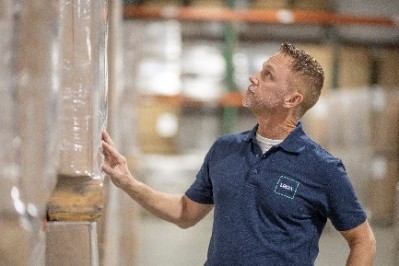
Carbon Border Adjustment Mechanism (CBAM)
Driving competitiveness and accountability in global carbon trade
Ensuring compliance with EU carbon regulations
The Carbon Border Adjustment Mechanism (CBAM) is a major initiative by the European Union (EU) designed to address carbon leakage and create a level playing field for domestic and imported goods in carbon-intensive sectors. As part of the EU’s ambition to achieve climate neutrality by 2050, CBAM complements the existing Emissions Trading System (ETS) by applying carbon pricing to imports.
At LRQA, we bring decades of expertise and industry insight to support organisations in complying with CBAM requirements. Our comprehensive services include verification, pre-verification, training and accredited verification, helping businesses adapt to this regulatory framework while maintaining their competitive edge.
What is the CBAM?
The Carbon Border Adjustment Mechanism (CBAM) is a key regulatory framework introduced by the European Union to address the risk of carbon leakage. CBAM encourages fair competition and supports global efforts to reduce greenhouse gas emissions by ensuring imported goods meet the same carbon pricing standards as EU-produced goods. The main objective is to support the EU’s climate goals while creating a fairer regulatory environment for global trade.
The scope of CBAM initially applies to six carbon-intensive sectors—cement, fertilisers, aluminium, iron, steel, hydrogen and electricity—with plans to include additional sectors, such as chemicals, at a later stage.
Who is impacted and when?
CBAM applies to organisations importing goods from external markets into the EU, with a phased implementation.
2023 - 2025
Transitional period
The first CBAM reporting period begins and obligations are restricted to reporting and a limited amount of goods.
From 2026
First full reporting year
Annual CBAM reports and certifications become mandatory. The first full reporting year will be 1 January 2026 – 31 December 2026.
2027 onwards
Verified emissions data
The first full reporting year will be 1 January 2026 – 31 December 2026. Business are required to submit their verified emissions data by 31 May 2027.
Are you ready for CBAM?
Preparing for the Carbon Border Adjustment Mechanism (CBAM) is essential for businesses importing goods into the European Union. The regulation introduces new obligations, including emissions reporting and the purchase of CBAM certificates. Ensuring readiness ahead of full implementation can help avoid compliance risks and maintain competitive advantage.

Training
Expand your knowledge of CBAM and GHG services with our range of courses that have been designed for varying levels of experience and learning styles.
Pre-verification services
Ensures your emissions data is accurate and meets EU standards. It focuses on testing internal ESG systems, verifying embedded emissions data and identifying potential risks, helping you prepare for full compliance with confidence.
How we can help
We provide a full suite of solutions to support you throughout your CBAM journey.
Are you ready for CBAM?
LRQA’s Pre-verification Services help you assess readiness, identify gaps and build robust reporting processes to ensure compliance. This can help your organisation avoid penalties and ensure compliance with CBAM requirements.
Contact us today
FAQs
What is the purpose of CBAM?
CBAM is designed to prevent carbon leakage by applying carbon pricing to imports. This ensures that imported goods meet the same emissions standards as those produced in the EU.
Which sectors are covered by CBAM?
CBAM currently applies to carbon-intensive industries such as cement, fertilisers, aluminium, iron, steel, hydrogen and electricity. Additional sectors may be included in the future.
When does CBAM take effect?
The transitional phase began on 1 October 2023, requiring emissions reporting. Full implementation starts on 1 January 2026, when importers will need to purchase CBAM certificates.
How can LRQA help with CBAM compliance?
LRQA offers a range of services including pre-verification, gap analysis, advisory support, accredited verification and compliance training, helping organisations meet CBAM requirements effectively.
What is pre-verification and why is it important?
Pre-verification ensures your emissions data is accurate, reliable and aligned with CBAM requirements. It identifies gaps in your reporting processes, assesses the accuracy of embedded emissions data, and highlights potential compliance risks. By addressing these issues early, pre-verification helps streamline the full verification process and positions businesses to meet regulatory standards confidently when CBAM is fully implemented.
How does CBAM relate to the EU Emissions Trading System (ETS)?
CBAM is designed to complement the EU ETS by addressing carbon leakage and ensuring fair competition between EU-produced goods and imports. While the EU ETS applies carbon pricing to emissions generated within the EU, CBAM extends this principle to imports by requiring importers to purchase CBAM certificates equivalent to the embedded emissions in their goods. This alignment ensures that the same carbon costs are applied to both domestic and imported products, supporting the EU’s climate neutrality goals.
What happens if an organisation fails to comply with CBAM?
Non-compliance may lead to fines, legal penalties or trade disruptions. Proactive compliance ensures competitiveness and alignment with EU sustainability objectives.
Why work with us?
Global Capability
Our solutions are delivered by a global team of specialists in ESG, carbon management, supply chain, and compliance. With experience across industries and regions, we are well-placed to support your business in navigating CBAM requirements, no matter where you operate.

We Partner with you
We work closely with our clients to understand the specific challenges CBAM presents to their business. By forming deep partnerships, we identify tailored solutions that address risks and opportunities, ensuring compliance and competitiveness in the evolving regulatory landscape.

A history of firsts
As pioneers in delivering certification services for quality, environmental and safety standards, we bring decades of expertise to emerging regulations like CBAM. Our involvement in shaping ESG standards positions us as a trusted partner in managing compliance.

Data-driven insights
Our investment in digital platforms and analytics enables us to provide actionable insights into your operations. These capabilities, combined with human expertise, allow us to identify and mitigate risks within your supply chain and reporting processes.



